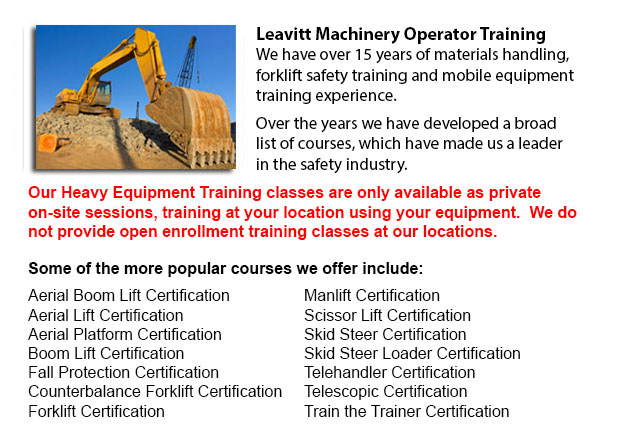
Heavy Equipment Operator Certification London - The person who manipulates the controls and drives various kinds of heavy machines is known as a heavy equipment operator. Most commonly, this machine is utilized on construction sites in order to lift and deliver heavy supplies and in order to move earth and perform construction tasks. Heavy industrial equipment may consist of backhoes, cranes, bulldozers and excavators. The operator must follow safety procedures as he maneuvers the machine to complete his job. He might be the sole equipment operator on the jobsite or as part of a team.
A heavy equipment operator will use different construction equipment, depending upon the nature of the task at hand. The huge equipment are built to carry out specific tasks in the most efficient manner for each industry. Different types of machines are small enough to be utilized inside of warehouses or inside plants, and may be particularly designed to move pallets and boxes. Larger machinery is normally used outdoors to clear areas and grade land in preparation for construction.
Lots of work projects will require a qualified heavy equipment operator, like for example a lot of private endeavors and public works projects. Public works tasks may comprise the construction of roads or a bridge. There are many other publicly funded projects that include airport runways, dam construction, levees, power plants and municipal structures. Private projects may include the construction of malls, office buildings, retail stores and industrial parks.
Small scale jobs will normally need heavy machinery to be utilized in huge industrial spaces or within commercial buildings. The machines that would be used in this particular instance, consists of cherry pickers, pallet jacks and forklifts. Trenchers and backhoes are often offered in different sizes appropriate for work needing less bulky and powerful machines.
Generally, a heavy equipment operator is required to be certified by local or regional agencies. Some are cross-trained and certified to operate a lot of different machine types. Others prefer to specialize in operating only one type of machinery and just require periodic updates on their operating permit certifications.
The employers working in this business operating heavy machines would typically be trained by taking a formal apprenticeship course or by receiving on-the-job training by their unions or companies. It is essential that employers hire completely-trained heavy equipment operators to adhere to local rules and adhere to local and regional laws regarding worker safety and job conditions.
-
Forklift Training Course London
Forklift Training Course London - Federal and industry regulators have established the criteria for forklift safety training according to their existing standards and regulations. Individuals wishing to utilize a forklift must complete a forklift tra... More -
Telehandler License London
Telehandler License London - A telehandler or telescopic handler is a machine which is generally utilized in agricultural and industrial applications. It has a similar appearance to a forklift and even functions in a similar way, even if, the telehan... More -
Forklift Training Schools London
Forklift Training Schools London - Forklift Training Schools - For The Safety Of Your Staff Are you looking for a job as a forklift driver? Our regulatory-compliant mobile equipment operator training offers instruction in kinds of forklifts, pre-s... More -
Heavy Equipment Certification London
Heavy Equipment Certification London - Large pieces of machinery and heavy-duty vehicles are usually referred to as heavy equipment. This broad term includes utility vehicles from agricultural and forestry implements to construction equipment, civil... More -
Telehandler Training in London
Telehandlers or also called Telescopic handlers are really popular piece of heavy construction equipment normally used in agriculture and construction trades. These machines have farthest reaching capability and are able to get to places where a stan... More -
Heavy Equipment Operator Training London
Heavy Equipment Operator Training London - Training facilities which offer quality standards within the industry and not only offer field performing tasks but added machine training are really in demand. Accredited schools provide students the unders... More -
Telehandler Training Courses London
Telehandler Training Courses London - The employer has the responsibility to make certain that their workers are trained to work competently using telehandler machinery. The staff have to be assessed for their skill to make use of the machine. If def... More -
Heavy Equipment Training Programs London
Heavy Equipment Training Programs London - At whichever given construction site, there are usually various kinds of equipment which are ready to be used. These heavy and light equipment require both operators to run them and mechanics to fix them. Tr... More

Forklift Training London
TOLL FREE: 1-888-254-6157
London, Ontario
forklifttraininglondon.ca
Email Us
About Us


